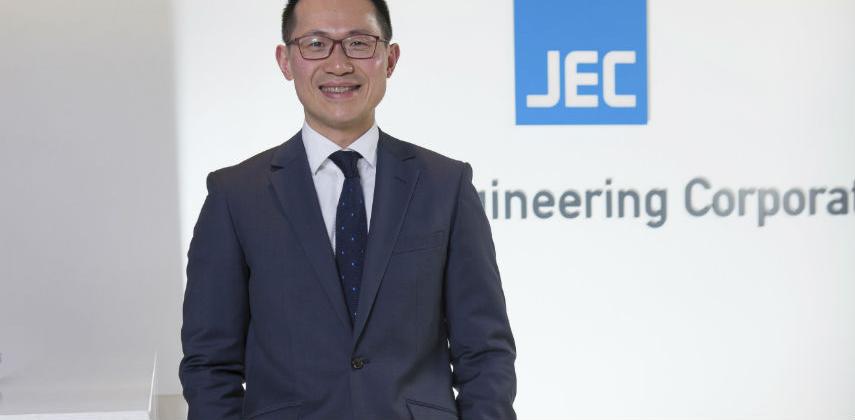Encompassing comprehensive departmental rotation and regular interaction with top executives, The Jardine Engineering Corporation Ltd (JEC) management trainee (MT) programme aims to nurture well-rounded future company leaders with in-depth engineering expertise.
The intensive two-year MT programme equips trainees with essential all-round skills and knowledge and elevates their motivation, says Philip Chiu, Executive Director – Human Capital and Communications of JEC, a member of the Jardine Matheson Group.
There are three core business units in JEC, namely Maintenance and Renovation; Electrical and Mechanical Contracting; and Building Equipment and Products. During the programme, trainees are assigned to a business unit for 14 months. They will spend the rest of the programme on rotation placements with the other units and the Central Services Division, which looks after quality, environmental, health & safety, commercial & engineering support, human capital, finance, IT and administration.
Apart from building a sound understanding of the operations, it is vital that the trainees network with the key personnel in various divisions. “In the future, they will need to accurately identify and match individuals with specific projects,” Chiu adds.
The programme also equips the trainees with a thorough understanding of finance. “The financial aspect is a core focus of their initial training with central service,” he adds. “They get to know about financial terminology and ways to generate profitability through projects, among other matters.”
Many tutors support the programme and each trainee is assigned a supervisor. The Human Capital Department works with the trainees closely to establish a bond. The department will hold monthly meetings with the trainees in the first year to get their feedback and suggestions for enhanced programme engagement.
The Department also decides on trainees’ secondment opportunities at overseas operations, which are the key component of JEC’s global presence. “When the trainees go into the pipeline after the end of the first year, we will consider if any are suitable for overseas attachment for the important exposure,” Chiu adds. “They must be independent and able to contribute to the operations.”
JEC’s overseas subsidiaries are in Thailand, Singapore and the Philippines. It also operates joint ventures in China and Thailand.
Apart from building a sound understanding of the operations, it is vital that trainees network with key personnel in various divisions. “In the future, they will need to accurately identify and match individuals with specific skills or projects,” Chiu says. The trainees are also given many opportunities for direct interaction with top executives, Chiu notes. “This helps them cultivate a broadened horizon and stay informed on new corporate developments.”
JEC supports the trainees to become chartered engineers through the Hong Kong Institute of Engineers’ Scheme A. “We aim to help fast-track them so they will acquire the qualification within six years, including four years of practical experience. The brighter ones can even become chartered engineers in five years,” Chiu says.
While the MT programme seeks university graduates from programmes such as electrical, mechanical or building services, those from construction, industrial and electronics programmes will also be considered. They should have a strong analytical mind, management sense, excellent communication skills and a positive attitude.
“Our mission is to ‘Engineer a Better Asia’. We want graduates who have an acute sense of the latest social issues to join our company. They need to be aware of the social impact of what they do,” Chiu says. “Besides, they should have high respect for engineers, who value seniority and hierarchy. Trainees need to deal with engineers with a positive attitude.”
The senior management of JEC is heavily involved in the MT programme. The trainees have many opportunities for direct interaction with top executives, such as CEO breakfast and lunch meetings, Chiu says. “This helps them cultivate a broadened horizon and stay informed on new corporate developments. Apart from JEC activities, the trainees also join the Jardine Matheson Group’s activities.”
Apart from respect and its mission, the other pillars of JEC’s corporate culture include its five core values. “Dynamic” sees employees effectively adopting innovative solutions. “Customer-oriented” means developing customisation for individual clients. All employees need to be “technically proficient”. They are also “responsible”, including the willingness to help others in an emergency. “Dependable” refers to how employees are trustworthy and inspire the confidence of clients.
Dennis Yeung Kai-yuen, who completed the programme in 2013, says the one-year secondment to JEC’s regional company in Singapore was a rewarding experience. “I got great exposure to the entire process of air-conditioning projects. I was involved from the initial design, to cost calculation to the contractor work, giving me huge sense of accomplishment. This was an experience that provided me with great job satisfaction,” says Yeung, a graduate from the Hong Kong Polytechnic University (PolyU) with a BEng in Building Services Engineering. “I was able to polish my language skills in English and Putonghua through frequent meetings with colleagues and clients.”
Yeung adds he has enhanced his independence and time-management techniques. “I have also sharpened my interpersonal skills through constant interaction with managers, workers and clients.”
Two trainees recruited in 2014 agree that the MT programme is uniquely tailor-made to meet their needs. Frank Lee Siu-hang, a PolyU graduate with a BEng in Mechanical Engineering and a BBA in Management, believes the programme gives him good exposure to engineering and management. “This programme really tailors its training schedule to suit individual trainees based on their characters and needs,” Lee notes.
Bonnie Liao Wen-wen graduated from Sun Yat-Sen University with a BEng in Energy Engineering and Thermal Science, and from the Hong Kong University of Science and Technology with a Master’s degree in Mechanical Engineering. She says the rotation aspect of the programme helps deepen her understanding of various aspects of engineering, while the highly focused objectives training helps her learn how a project is developed from scratch. “I also look forward to the additional workshops designed to develop our management skills,” she says.


